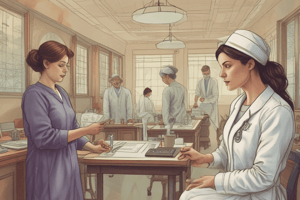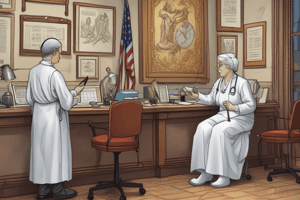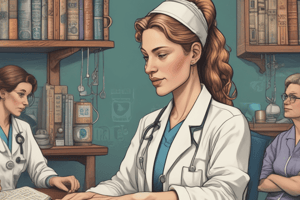Podcast
Questions and Answers
What does critical thinking enable nurses to do in their daily decision-making?
What does critical thinking enable nurses to do in their daily decision-making?
- Rely solely on memorized facts
- Avoid uncomfortable decisions
- Think clearly and make connections between ideas (correct)
- Follow routines without questioning
Which component of critical thinking involves decision-making and reasoning?
Which component of critical thinking involves decision-making and reasoning?
- Mental Operations (correct)
- Practical Skills
- Knowledge
- Experience
What is expected from nursing students in relation to knowledge acquisition?
What is expected from nursing students in relation to knowledge acquisition?
- To understand the reasoning behind the knowledge (correct)
- To avoid practical application of learned concepts
- To memorize facts without understanding
- To prioritize theoretical knowledge only
What is a result of effective mental operations in critical thinking?
What is a result of effective mental operations in critical thinking?
Why is broad knowledge important for nurses?
Why is broad knowledge important for nurses?
What is the first step in the scientific problem solving process used by healthcare professionals?
What is the first step in the scientific problem solving process used by healthcare professionals?
Which aspect is crucial for a nurse to utilize when they sense a problem without clinical signs?
Which aspect is crucial for a nurse to utilize when they sense a problem without clinical signs?
In the intuitive problem solving scenario, what vital sign change did the nurse observe?
In the intuitive problem solving scenario, what vital sign change did the nurse observe?
What step follows 'hypothesis formulation' in the scientific problem solving process?
What step follows 'hypothesis formulation' in the scientific problem solving process?
Why is decision making considered critical in nursing?
Why is decision making considered critical in nursing?
How does a nurse typically confirm an instinctive concern about a patient’s condition?
How does a nurse typically confirm an instinctive concern about a patient’s condition?
What is considered a key attitude for a critical thinker?
What is considered a key attitude for a critical thinker?
What is the final step in the scientific problem solving process?
What is the final step in the scientific problem solving process?
What could be an outcome of the intuitive approach taken by the nurse in the scenario provided?
What could be an outcome of the intuitive approach taken by the nurse in the scenario provided?
How do professional nurses differentiate themselves from technical personnel?
How do professional nurses differentiate themselves from technical personnel?
Which attitude is essential for dealing with uncertainty in nursing?
Which attitude is essential for dealing with uncertainty in nursing?
What is an important action for nurses when a patient's condition worsens?
What is an important action for nurses when a patient's condition worsens?
Which of the following is an attitude that supports critical thinking?
Which of the following is an attitude that supports critical thinking?
What describes the approach required when facing unique patient health problems?
What describes the approach required when facing unique patient health problems?
Which attitude is characterized by maintaining respect for different perspectives?
Which attitude is characterized by maintaining respect for different perspectives?
How should nurses approach the gathering of information regarding patient problems?
How should nurses approach the gathering of information regarding patient problems?
What is a potential limitation of heat therapy in pain management?
What is a potential limitation of heat therapy in pain management?
At the commitment level of critical thinking in nursing, what is expected from a nurse?
At the commitment level of critical thinking in nursing, what is expected from a nurse?
What is a key characteristic of critical thinking in nursing?
What is a key characteristic of critical thinking in nursing?
In the catheter care example, what did the nurse first suspect after noticing a change in urine color and odor?
In the catheter care example, what did the nurse first suspect after noticing a change in urine color and odor?
What immediate action did the nurse take upon noticing the patient's drop in oxygen saturation?
What immediate action did the nurse take upon noticing the patient's drop in oxygen saturation?
How does a complex critical thinker approach problem-solving?
How does a complex critical thinker approach problem-solving?
What medical condition did the nurse consider when evaluating the patient's fluid situation?
What medical condition did the nurse consider when evaluating the patient's fluid situation?
What is the first step in the scientific method?
What is the first step in the scientific method?
What defines basic critical thinking in nursing?
What defines basic critical thinking in nursing?
Why was oxygen administered to the patient after their blood units were started?
Why was oxygen administered to the patient after their blood units were started?
Which of the following actions exemplifies complex critical thinking?
Which of the following actions exemplifies complex critical thinking?
What conclusion did the nurse draw about the patient's condition after noting the crackles in both lungs?
What conclusion did the nurse draw about the patient's condition after noting the crackles in both lungs?
What condition did the patient have that contributed to their fluid retention?
What condition did the patient have that contributed to their fluid retention?
What suggestion did the nurse make to the doctor regarding the patient's treatment?
What suggestion did the nurse make to the doctor regarding the patient's treatment?
What role does diversity of opinion play in basic critical thinking?
What role does diversity of opinion play in basic critical thinking?
How did the nurse ensure that their recommendation to the doctor was accurate?
How did the nurse ensure that their recommendation to the doctor was accurate?
What outcome might a nurse consider when using complex critical thinking for pain management?
What outcome might a nurse consider when using complex critical thinking for pain management?
Which medication was ultimately given to the patient to help with fluid retention?
Which medication was ultimately given to the patient to help with fluid retention?
Which statement best describes the transition from basic to complex critical thinking in nursing?
Which statement best describes the transition from basic to complex critical thinking in nursing?
What should not be a practice guide for nursing according to the content provided?
What should not be a practice guide for nursing according to the content provided?
What was noted upon examination of the patient's lungs after administering blood?
What was noted upon examination of the patient's lungs after administering blood?
What is a common misconception about critical thinking in nursing?
What is a common misconception about critical thinking in nursing?
Which statement best describes the role of evaluating results in the scientific method?
Which statement best describes the role of evaluating results in the scientific method?
What was the patient's oxygen saturation level just before administering the Lasix?
What was the patient's oxygen saturation level just before administering the Lasix?
Flashcards
What is critical thinking?
What is critical thinking?
Critical thinking is the process of analyzing information, forming judgments, and making informed decisions based on logic and reason.
Mental Operations
Mental Operations
Mental operations are the actions, like planning and decision-making, involved in critical thinking.
Critical Thinking in Nursing
Critical Thinking in Nursing
Nurses use critical thinking to make informed decisions about patient care based on the nursing process.
Knowledge Base for Nurses
Knowledge Base for Nurses
Signup and view all the flashcards
Critical Thinking and Problem Solving
Critical Thinking and Problem Solving
Signup and view all the flashcards
Why are attitudes important in critical thinking?
Why are attitudes important in critical thinking?
Signup and view all the flashcards
What does 'tolerance' mean in critical thinking?
What does 'tolerance' mean in critical thinking?
Signup and view all the flashcards
What is 'intellectual courage'?
What is 'intellectual courage'?
Signup and view all the flashcards
How does critical thinking relate to nursing practice?
How does critical thinking relate to nursing practice?
Signup and view all the flashcards
What sets apart professional nurses?
What sets apart professional nurses?
Signup and view all the flashcards
Why are no two patient situations alike?
Why are no two patient situations alike?
Signup and view all the flashcards
How does the nurse approach a patient's problem?
How does the nurse approach a patient's problem?
Signup and view all the flashcards
Critical Thinking
Critical Thinking
Signup and view all the flashcards
Levels of Critical Thinking
Levels of Critical Thinking
Signup and view all the flashcards
Basic Critical Thinking
Basic Critical Thinking
Signup and view all the flashcards
Basic Critical Thinking: Example
Basic Critical Thinking: Example
Signup and view all the flashcards
Complex Critical Thinking
Complex Critical Thinking
Signup and view all the flashcards
Complex Critical Thinking: Example
Complex Critical Thinking: Example
Signup and view all the flashcards
Advocate
Advocate
Signup and view all the flashcards
Commitment Critical Thinking
Commitment Critical Thinking
Signup and view all the flashcards
Independent Decision Making
Independent Decision Making
Signup and view all the flashcards
Advocating for Action
Advocating for Action
Signup and view all the flashcards
Recognizing Patterns
Recognizing Patterns
Signup and view all the flashcards
Fluid Overload
Fluid Overload
Signup and view all the flashcards
Lasix
Lasix
Signup and view all the flashcards
Crackles in Lungs
Crackles in Lungs
Signup and view all the flashcards
Oxygen Saturation
Oxygen Saturation
Signup and view all the flashcards
Scientific Method
Scientific Method
Signup and view all the flashcards
Problem Solving
Problem Solving
Signup and view all the flashcards
Trial-and-Error Problem Solving
Trial-and-Error Problem Solving
Signup and view all the flashcards
Congestive Heart Failure (CHF)
Congestive Heart Failure (CHF)
Signup and view all the flashcards
Intake and Output
Intake and Output
Signup and view all the flashcards
Scientific Problem Solving
Scientific Problem Solving
Signup and view all the flashcards
Intuitive Problem Solving
Intuitive Problem Solving
Signup and view all the flashcards
How does intuitive problem solving work?
How does intuitive problem solving work?
Signup and view all the flashcards
What is a key characteristic of intuitive problem solving?
What is a key characteristic of intuitive problem solving?
Signup and view all the flashcards
What is decision making in nursing?
What is decision making in nursing?
Signup and view all the flashcards
Why is decision-making crucial in nursing?
Why is decision-making crucial in nursing?
Signup and view all the flashcards
Study Notes
Introduction
- Critical thinking is a daily activity, even if not always consciously recognized.
- Everyday examples include changing clothes for the weather or choosing appropriate shoes for a walk.
- Critical thinking is essential in nursing, as nurses constantly make decisions based on patient needs.
- Critical thinkers analyze situations beyond the obvious, connecting ideas to solve problems appropriately.
- Nursing students/graduates must demonstrate critical thinking skills in practice.
Components of Critical Thinking
1- Mental Operations
- Mental operations encompass activities like decision-making and reasoning, enabling meaning creation.
- The result of these operations leads to resourceful problem-solving.
- Other related cognitive skills include planning and evaluating one's thinking.
2- Knowledge
- Nursing curricula teach specific factual information for quality care delivery.
- Nurses are expected to understand the reasoning behind the facts, not just memorize them.
- Critical thinking requires a broad base of knowledge, including information from various disciplines (science, psychology, philosophy, nursing).
- This knowledge is applied to individual patient cases through critical thinking.
3- Attitudes
- Certain attitudes cultivate critical thinking ability.
- Curiosity and an interest in exploring and questioning are particularly crucial attributes of a critical thinker.
- Other vital attitudes include tolerance, open-mindedness, intellectual courage, respect for diverse perspectives, and handling uncertainty with intellectual humility, and self-confidence.
Clinical Decisions in Nursing Practice
- Nurses are responsible for accurate clinical decisions, which distinguish them from technical personnel.
- Nurses constantly observe patient changes, recognizing potential problems and taking immediate action.
- Individual patient cases are unique and require adapting critical thinking skills.
- Gathering information, examining ideas, and using scientific principles and developing an approach to patient care are central to successful critical thinking.
Levels of Critical Thinking in Nursing
Basic Critical Thinking
- Involves trusting experts as having the correct answers for every problem.
- Basic critical thinking relies on procedural guidelines.
- Examples include adhering to protocols or using manuals for guidance (e.g., Foley catheter insertion).
Complex Critical Thinking
- Individuals begin to detach from expert opinions, analyzing and evaluating solutions independently.
- They analyze and evaluate solutions with an eye to weighing potential benefits and risks, even in routine scenarios.
Commitment Critical Thinking
- Individuals predict outcomes of situations and actions independently.
- Accepting accountability for decisions is crucial.
- Recognising that actions can be delayed or not acted upon depending on experience and knowledge, is fundamental.
Critical Thinking and Solution
- Examples show how nurses apply clinical reasoning by recognizing patient changes.
- Critical thinkers pause to consider possible factors related to clinical changes.
- Collecting information and analyzing potential problem causes are important steps.
- Assessing clinical changes and evaluating options before making decisions are essential.
Critical Thinking Competencies
General Critical Thinking - Scientific Method
- The scientific method uses reasoning in problem-solving; has five steps: identifying the problem, collecting data, formulating a question or hypothesis, testing and evaluating results.
Problem Solving - Trial and Error
- Involves trying solutions until a successful one is found.
- This method is less effective than other approaches, and potentially more dangerous to patients.
Problem Solving - Scientific Problem Solving
- A systematic, multi-step process to problem solving.
- Involves identifying problems, gathering data, formulating hypotheses, devising solutions, testing and evaluating results.
Problem Solving - Intuitive Problem Solving
- Involves relying on gut feeling and instinct.
- It helps in quickly identifying situations needing attention, even when no clinical signs are evident.
General Critical Thinking - Decision Making
- Critical thinking focuses on choosing a course of action, problem resolution, and evaluating patient needs.
- Examples include determining patient care priorities.
Potential Errors in Decision Making
- Biases are errors in decision-making.
- They include favoring readily available data or ideas or avoiding information contradicting existing beliefs.
- Failing to consider the total situation or using inaccurate data can also be crucial errors.
- Impatience in identifying multiple potential solutions, or in implementing decisions, or using resources inappropriately, can also lead to mistakes.
Specific Critical Thinking - Diagnostic Reasoning and Inference
- An expert nurse considers various factors to evaluate health issues.
- This includes noticing patterns associated with clinical problems (e.g., a patient experiencing dizziness, blurred vision, a past history of diabetes is likely suffering from hypoglycemia.
Nursing Process as a Competency
- Nursing process is a model for delivering patient care. It incorporates problem-solving steps in patient care including assessment, diagnosis, planning, implementation, and evaluation.
- Using the nursing process for delivering patient care to improve overall health outcomes.
A Critical Thinking Model for Clinical Decision Making
- Knowledge, Experience and Attitudes are components of critical thinking.
I-Specific Knowledge Base
- Critical thinking starts with understanding a specific set of knowledge.
- This knowledge encompasses a range of information obtained through various education levels, ensuring a broad and accurate comprehension of patient cases.
II- Experience
- Experience is an essential component of critical thinking. Clinical experiences build upon knowledge, enabling nurses to identify and analyze situations relevant to patient care.
- Clinical skills are developed and refined through practice to improve patient outcomes.
III- Attitudes for Critical Thinking - Confidence
- Awareness of strengths and limitations of knowledge and expertise.
- Having a knowledge base and appropriate confidence before interacting with patients.
- Promoting patient safety.
III- Attitudes for Critical Thinking - Thinking Independently
- A critical thinker does not blindly accept ideas, but questions and analyzes different perspectives and reasoning that apply to patient situations and care.
- They ask questions to find evidence behind certain problems.
III- Attitudes for Critical Thinking - Responsibility and Accountability
- Responsibility and accountability for performing nursing care activities correctly.
- Adhering to minimum performance standards in patient care.
- Taking ownership for your decisions and the outcomes of your actions.
III- Attitudes for Critical Thinking - Risk Taking
- Acknowledging risk-taking plays a positive role in critical thinking, particularly when it leads to desirable outcomes.
- Assessing risks is crucial to successful risk-taking, and this involves safety procedures and considering patient well-being.
III- Attitudes for Critical Thinking - Discipline
- Being thorough and accurate in evaluating patient cases and identifying the most suitable interventions for patients.
- Gathering detailed information including the nature of the problem and associated factors in making decisions about patient care.
III- Attitudes for Critical Thinking - Creativity
- Using original thinking for coming up with options and unique approaches when caring for patients that require specific solutions.
III- Attitudes for Critical Thinking - Curiosity
- Using a sense of curiosity to investigate further or seek insights into specific cases, to identify solutions, for the benefit of improving care outcomes.
- Consulting with an expert (e.g physician) or examining relevant research.
III- Attitudes for Critical Thinking - Integrity
- Being honest and owning mistakes made during clinical practice.
- Demonstrating trustworthiness when dealing with clinical dilemmas and issues.
III- Attitudes for Critical Thinking - Humility
- Respect for limitations in knowledge and skills.
- Seeking additional knowledge and skills as needed for providing effective patient care.
Critical Thinking Synthesis
- A crucial aspect of critical thinking in Nursing practice is integrating knowledge, experience and attitudes to generate appropriate solutions.
- The nursing process is also significant in critical thinking in the practice of nursing.
Studying That Suits You
Use AI to generate personalized quizzes and flashcards to suit your learning preferences.




